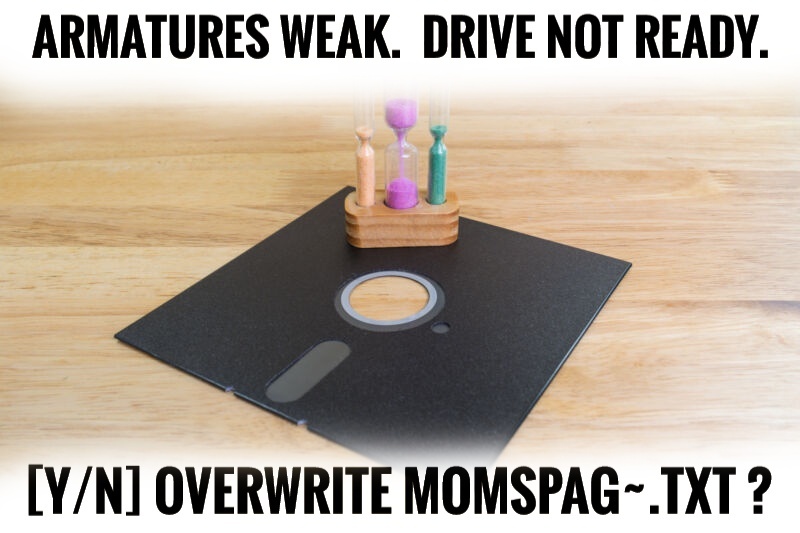Shoutout to the stock image photographer who put an egg timer on a 5.25" floppy disk to symbolise the looming spectre of obsolescence.
deleted by creator
I know my voice carries weight so I try to use it to support the little guy.
Born is the memes.

The person was really inspired.
When I was a student I never understood how something like this could happen. “Just rewrite it” I thought, how hard can that be. But working in a corporate environment I now totally understand it. Everything you write will at some point become part of code that, to the fast majority of colleagues, will just be a black box that they’ve never touched and don’t intend to. Despite my urge to test and document everything, I’ve already more than once complained about my own code, only realizing later that I wrote it myself. Often you can still find out what it does, but the “why” gets lost and because of that people are afraid to change it.
Often you can still find out what it does, but the “why” gets lost and because of that people are afraid to change it.
I feel like this is what gets lost whenever documentation is talked about. Yes, you should probably be able to work out what something does by looking carefully at it - but why can be so easily lost!
Well I suppose that reminds me, I ought to comment the why and the where a bit more lol
Or there was documentation. You even remember reading it.(Or writing it) But since then we’ve changed from shared folders to SharePoint to something else, and reorganized folder hierarchy at least five times. I have no idea where to find it, or if it was purged in one of the cleanups.
The real question is why did they install a system based on 5.25" floppy disks in 1998 in the first place!?
The 5.25" floppy was surpassed by the 3.5" floppy by 1988 - ten years prior to this systems installation - and by 1998 most new software was being distributed on CD-ROM. So by my reckoning, in 1998 they installed a ‘new’ system based on hardware that was 1.5 generations out-of-date and haven’t updated it in the 26 years since.
My theory: the system they purchased was based on an older and proven design for railway automation and control. Add to that however said company/contractor was set up to support their customers (e.g. OS only ships on floppy). That said, I agree that ten years without so much as a drive upgrade is a bit long in the tooth for something that can kill people or become a logistic and/or political disaster if it malfunctions.
Your excuse for touching it is also their excuse for not touching it.
The business world moves very slowly.
“Out of date” tech to some people is battle-tested to others.
You must not be familiar with government procurement
Hey babe, wanna see my 5.25" floppy? And if you think that’s good, just wait 'til you see my hard disk
Drive it right into my slot
Hey baby, you turned my software into a hardware
Hey baby, are you a QWERTY keyboard? Because U and I belong together
Strangely my hard disk is only 3.5" though.
zips
Zed said it best
Here is an alternative Piped link(s):
https://piped.video/H0FBGrtAicY?t=130
Piped is a privacy-respecting open-source alternative frontend to YouTube.
I’m open-source; check me out at GitHub.
“The system is currently working just fine, but we know that with each increasing year, risk of data degradation on the floppy disks increases and that at some point there will be a catastrophic failure,” Tumlin told ABC7.
Have they literally been using the same set of disks for decades? Surely they can just … make fresh copies on new disks? As far as I know, they’re still being made for specialized industries just like this.
Certainly, they should upgrade their system - this just doesn’t feel like the most important reason to do so.
There are many replacements for disk drives available where you can just use memory cards instead, and the old system won’t notice the difference. It’s odd that they used 5.25" floppies in 1998 in the first place, and odd that they don’t take this simple step to make the system more reliable and maintainable.
Yeah, I’m guessing there must be some archaic code in their system (probably undocumented and which no one understands) keeping them from taking that step. I’ve worked in the embroidery industry for quite a while and our machines used 3.5 inch floppies for years. We finally upgraded to a drop-in USB replacement like 5 years ago.
They are obviously of the “If-It-Ain’t-Broke-Don’t-Fix-It” people. A once dominant group, they also age slowly, have the longest memories and loquaciously share them.
I read an article fairly recently stating that the last manufacturer of the 3.5 has stopped production back in 2011, and the 5.25 was over 5 years before that.
But supposedly there’s a little business called Athana that still makes them, along with other really old and way out of date media’s. Even 8" floppies.
New disks?
They haven’t made floppies for years now, iirc.
You can grab a 10 pack of DS, HD 5.25" on Amazon for $30 apparently
Floppies got worse over time. Stuff that was commercially duplicated was usually high quality, and those are still OK for the most part. The consumer-level blank disks, though? By the late 90s, those were hot garbage. You’d buy a 10 pack and at least 3 of them had to be thrown out. We’re burning through the old stock from that time, and with degradation over time, it’s now more like 6 out of 10 being thrown out. It’s not like the “good” ones in the box are going to last, either.
I don’t expect them to, just noting there are still new ones out there.
And while something new is being developed/tested, having a metric fuck ton of backup floppies isn’t the worst idea.
This is interesting. The longevity of this legacy tech may be secure if they use the right channels.
SoCal happens to have a very active retro-computing scene right now, much of which is in the bay area. If they can breathe life into an Apollo Guidance Computer, bog-standard floppy drives will be a piece of cake.
On the other hand, the same scene has modern emulation for just about every (popular) legacy media format imaginable. Upgrading the drives to use SD cards and USB thumbdrives is something they could buy off the shelf today: Apple II, C64, Tandy, misc. So there’s no reason to suffer through hardware failures when more reliable tech is available.
There are even commercial options out there. Example: https://www.shopfloorautomations.com/hardware/floppy-connect/
More: https://en.wikipedia.org/wiki/Floppy_disk_hardware_emulator
That video series on restoring the Apollo computer is excellent - very smart people solving obscure challenges and taking the time to explain each step as they go. One of the best things on YouTube, and fascinating if you’re the right kind of nerd.
I think that underestimates the difference between handling tech that need to keep people alive and restoring a computer that sits in a basement and is not expected to do anything more than provide cool entertainment.
Going through testing, certification, documentation and training for a USB adapter would cost millions, even if the piece was available off the shelf for 50 bucks.
The floppy is just the funny visible part of the issue, the core issue is that their whole stack has seen the dinosaurs roam free.
Here is an alternative Piped link(s):
breathe life into an Apollo Guidance Computer
Piped is a privacy-respecting open-source alternative frontend to YouTube.
I’m open-source; check me out at GitHub.
I’ve read that headline a few times recently, and I’m wondering if they can’t replace floppy drive with sd-card based reader exposing the same interface. I know we did that a lot with floppy back when it was still a thing.
Tape still one of the most stable storage mediums
Yes though the failure rate of actually trying to read it later when you need it is quite high in my experience.
This person had a C64
Close. First tape experience was a TRS-80. Later moved on to DATs on various Unix boxes, AIX, Solaris, Linux. I did own an Amiga but it had a 3.5" disk and even a 20mb hdd! During the c64 era I was on Apple II, also floppies.
Mine was an acorn nothing like coming back from waiting for a last ninja to load with a nice read error instead
Not to mention you had to type the whole freaking program in line by line from a book where the program was written out over 10 pages, then wait 2 hours for it to load from tape and if you made a single mistake you had to type the whole damn thing in again.
At least we have some proper old man stories we have to tell our kids about how hard we had it.
In today’s episode of if it ain’t broke don’t fix it
(San Francisco trains are broke)
Could be worse, could be 8".
So long as they still work well that’s perfectly fine. I don’t want public transit to need to be the newest shiniest thing, I want it to be effective, safe, and affordable. Physical media that’s difficult to acquire and alter is great. Hell I’d be fine with a “secure governmental bus” being developed that’s only legal to produce for government contracts. But yeah, I don’t want public transit to chase trends except of the population distribution variety (though I do support all hours driverless trains as a means to increase user convenience/price ratios)
If it ain’t broke don’t fix it
Until it finally broke and it was too late…
If it’s not maintainable or upgradable then it’s broke.
More like: it’s eventually going to break your weekend or even your whole week, but you don’t get to pick which one.
Edit: To put that in perspective, there are 260 working days in a year. Let’s say that you have just one of these hardware failures in a five-year career with the MTA. That’s roughly 1/1000 odds. If the lottery had chances like that, you’d play it every time.
Honestly it kinda sounds like this might break an entire city’s transportation system for more than just a whole week.
Well, that makes the tech debt at my company look like nothing lol
I mean, we even support ES8 and newer! Most of the older code is getting rewritten, slowly… lol
What’s next? Mfm hard drives?
Punch cards
deleted by creator











